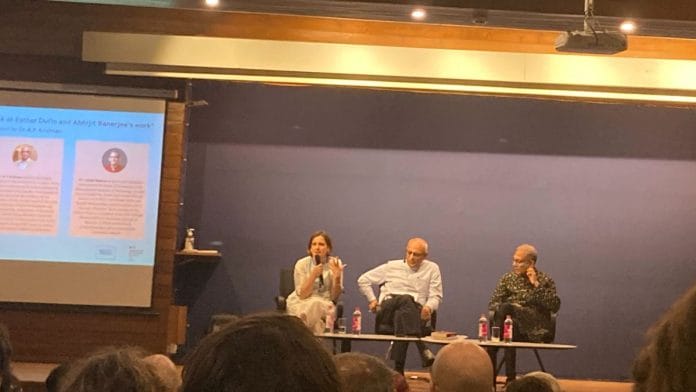New Delhi: Economics and poverty are not topics that make for light reading. But for Esther Duflo, the Nobel Prize-winning economist, it is important to have good books on these topics for children.
“As a child, I read books on poverty and they stayed with me for life. The books were really bad, filled with stereotypes, but they stayed with me. That made me want to write books for children because these stories stayed with me,” said Duflo to an intimate gathering of ambassadors, bureaucrats and academics at the Embassy of France on a Thursday evening in Delhi.
Duflo’s comments come as her new children’s book series, Poor Economics for Kids, illustrated by Cheyenne Olivier, was launched earlier this month. The series looks at questions surrounding poverty – environment, healthcare, employment and entrepreneurship – based on the stories of the character Nilou and her friends.
“I have always been interested in the process of writing a book. It was interesting from an intellectual point of view. However, to find a narrative that was engaging to make it legible for anyone who read it, was the challenge,” said Duflo.
Even while writing Poor Economics (2011), Duflo’s focus was taking readers “along for the ride”. The idea was to make them think about practical ways to deal with poverty, said Duflo about the book she co-authored with economist Abhijit Banerjee.
With her new series for children, Duflo hopes to also “touch the parents”. This will, perhaps, create space for straightforward conversations on a difficult subject like poverty.
The evening, which looked at the life and work of Duflo and her colleague Banerjee, was moderated by KP Krishnan, a former Indian bureaucrat and economist. Duflo and Banerjee founded together the Abdul Latif Jameel Poverty Action Lab (J-PAL) with their affiliate Michael Kremer, and jointly won the 2019 Nobel Prize in Economics.
Teaching at the right level
The discussion centred around Esther Duflo and Abhijit Banerjee’s work in practical interventions in the realm of education. And the audience’s questions revolved around the idea of ensuring that children are “taught at the right level” rather than what the curriculum dictates.
“One silver lining of the Covid-19 pandemic is that it is now okay to acknowledge that children may not be at the education levels they need to be. The focus is now on the early childhood education years and policies,” said Duflo.
You now have the need for more education, and with that, you need more teachers, she stressed. “But the teachers may not be at the levels required to teach the children.” This results in the “puzzle” of where children are unable to “apply” what they learn in school to their daily lives. Duflo, however, conceded that at the moment, there are not too “many solutions” for solving this core puzzle.
Banerjee stepped in here to add his thoughts, saying that the problem, for example in India, is not teacher-to-student ratios at public schools. Rather, it is getting educators to understand what teaching would have to be like.
“The failure of the education system is that it discourages you from thinking of the problem…Students get discouraged whenever they see an abstract mathematics problem because they think they failed out of school. That is an indictment of the education system,” said Banerjee.
For Duflo and Banerjee, the importance of their work is not in just finding out the problem but also translating the research into “action”. It is an approach that policymakers can use to make interventions based on scientific findings from experiments.
Once the “critical” issues are understood, it helps reduce the “local context” or the micro-nature of the finding and expand it across the board. But such interventions to reduce poverty, which may work, would not necessarily reduce the frustrations or wants of an individual, especially in an Indian context, added Banerjee.
“We need to acknowledge that in the process of changing aspirations, you may create other problems. Being more realistic about the problem of poverty in India and the pain point for the poor,” he said about India’s goal of becoming a developed nation by 2047.
(Edited by Zoya Bhatti)






